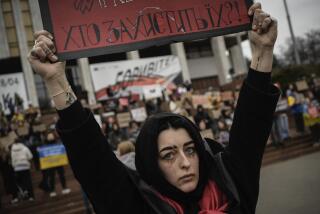Poland Orders Medication for Children, Restricts Milk
- Share via
WARSAW — The Polish government, acknowledging that fallout from a damaged Soviet nuclear reactor poses a potential hazard to human health, said Tuesday that it will issue medication to children in affected areas to protect against radioactive iodine.
In an official communique read on the evening television news, the government said it is also temporarily restricting the sale of milk to reduce the possible intake of iodine, a hazardous but short-lived component of fission wastes.
In addition, the communique warned of the “absolute necessity” of washing all fresh vegetables carefully to remove radioactive particles.
These precautionary steps followed daylong deliberations by a high-level government commission that convened early Tuesday, government spokesman Jerzy Urban said.
Made up of of senior military, health, energy, agricultural and environmental officials, the commission is headed by a deputy premier, Zbigniew Szalajda.
The government said its commission is in “constant and direct contact” with Soviet authorities and is consulting as well with the International Atomic Energy Agency in Vienna and with Scandinavian countries, where wind-borne fallout from the Chernobyl reactor was first detected Sunday in a broad arc reaching across Denmark, Sweden, Norway and Finland.
Radiation measurements made by the Polish air force and ground units Tuesday showed a rising level of radioactive iodine, as of 3 p.m., to levels that “could be hazardous if maintained for a longer period of time,” the government statement said.
It added that later measurements showed a “receding trend” in iodine levels and no increase in other radioactive isotopes from the damaged reactor at Chernobyl, 280 miles southeast of the Polish border in the Soviet Ukraine.
Scandinavian countries--nearly three times this distance from the accident site--have reported radiation levels 3 to 10 times above normal background, an intensity not considered generally hazardous to health. Polish authorities, however, have not released any figures for their measurements.
Highest in Northeast
Because of its proximity to the Ukraine, Poland is thought to have received a heavier dose of fallout than the Scandinavian countries, with monitoring sites in the northeast quarter of the country showing the highest readings.
Initially, the government said it was there that anti-radiation tablets will be distributed to children and infants. But a later statement carried on Warsaw radio suggested that a broader distribution is planned. The statement said that all children under the age of 6 in Warsaw, a city of 1.5 million, and the surrounding province will also begin receiving a one-time dose of the medication in kindergartens and nursery schools starting this morning.
The statement said there was no immediate danger from radioactive iodine and described this measure as a “precaution.” The government has not said how many children are to be treated altogether. Poland has a population of 38 million people.
In Thyroid Gland
Iodine moves readily into the food chain from grass, through cows and into man, and it tends to accumulate in the thyroid gland, where its radioactivity can lead years later to cancer. The medication that health authorities plan to distribute is designed to stimulate the excretion of iodine.
“The iodine occurring in the air can be harmful to infants, children and pregnant women,” the televised statement warned. “Experts recommend that people abstain from drinking milk that comes from cows fed with (fresh) green fodder.”
State-run dairy enterprises and collecting stations were instructed to sell only milk from cows fed on dry fodder drawn from protected storage areas. Iodine-131 has a half-life of 8.05 days, which means that half of any given quantity decays to harmless substances in that period of time.
Earlier Tuesday, Urban, the government spokesman, said that radioactive fallout has been detected at nearly all of 200 monitoring sites in the country. But he insisted there was no indication of a health hazard. He said the situation was “not deteriorating, and may even be improving.”
Plume of Wastes
This statement appeared to reflect a shift in prevailing winds toward the east and south, which would carry a plume of escaping fission wastes away from Poland and northern Europe and back toward the Soviet heartland.
The accident has posed a delicate political problem for Poland, which, like all other members of the Soviet Bloc, scrupulously avoids any public statement casting a negative light on the Soviet Union. Accordingly, Urban was extremely guarded in his comments, while trying at the same time to reassure a nervous public.
Discloses Little
Despite repeated questions from reporters at a midday press conference, he refused to say what, if anything, Poland has learned about the cause the accident, the status of the damaged power plant, the extent of casualties or even when and how the Polish government first learned about the accident.
“I have information only about the territory of Poland,” Urban said. He indicated that the government’s concern was focused on northeastern Poland, the area closest to Chernobyl, but he declined to provide any figures or other details of radiation measurements.
Poland, nominally a close friend and ally of the Soviet Union, may have learned about the accident even later than Sweden and Finland, where radiation sensors at nuclear power plants first detected an invisible plume of fallout coming from the east on Sunday. Scandinavian authorities have criticized Moscow for failing to warn neighboring countries of the potential radiation hazard.
Among the Last to Know
Urban said he was awakened with news of the accident between 1 and 2 a.m. local time Tuesday, which would have been hours after the official Soviet news agency Tass confirmed Western news reports of a possible reactor malfunction.
Polish news reports said the special government commission held its first meeting to discuss the implications for Poland on Tuesday morning, and met again in the afternoon. Urban said the commission was in “direct contact” with a Soviet commission investigating the accident, but that it would have no immediate comment on the accident itself.
Hours before the Polish public was told to take precautions against contaminated food, Western diplomats said they saw freshly posted notices in the Foreign Ministry building in Warsaw on Tuesday urging employees to keep the ministry’s windows shut.
More to Read
Sign up for Essential California
The most important California stories and recommendations in your inbox every morning.
You may occasionally receive promotional content from the Los Angeles Times.













